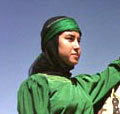| |
|
| Cultures and Gender Equality Our aim is to foster values and institutional changes that reinforce equality between women and men, boys and girls through research and analysis of gender in specific social and cultural institutions, including legal frameworks, and development of programmes that advance gender equality. |
 Gender inequality manifests itself in the family, labour market, political-juridical structure, and in cultural-ideological production. At the same time, gender relations interact with other relations of inequality based primarily on social class but also on race, caste, religion, and sexuality to structure institutions and daily life. In this regard, it is important to understand and recognize how values, norms, and practices that are embedded in particular domains or social institutions may foster inequality, reinforce power differentials between the sexes, or perpetuate violence against women.
Gender inequality manifests itself in the family, labour market, political-juridical structure, and in cultural-ideological production. At the same time, gender relations interact with other relations of inequality based primarily on social class but also on race, caste, religion, and sexuality to structure institutions and daily life. In this regard, it is important to understand and recognize how values, norms, and practices that are embedded in particular domains or social institutions may foster inequality, reinforce power differentials between the sexes, or perpetuate violence against women.
|
|
UNESCO SHS
Have feedback? Email the SHS Webmaster |
||